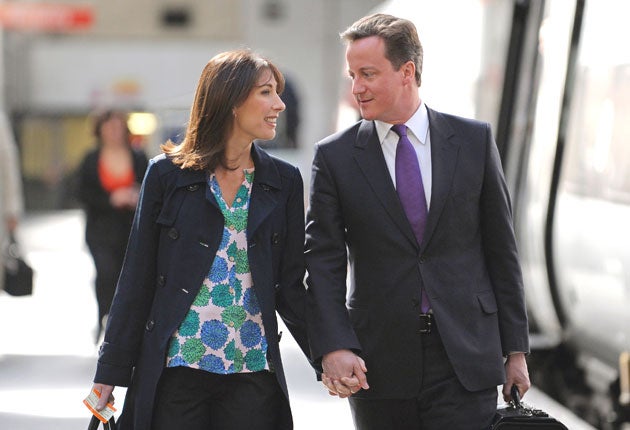Afghan war is unwinnable and we should not be there, say voters

The vast majority of voters are hostile to the war in Afghanistan and believe the political parties are failing to give voice to their opposition, a new poll has discovered ahead of the televised leaders' debate on foreign affairs tomorrow.
The ComRes survey for The Independent and ITV News finds that nearly three-quarters of electors view the conflict as "unwinnable" and more than half say they do not understand why British troops are still in Afghanistan.
Today's poll also suggests Tory support is recovering after Nick Clegg's strong performance in the first debate last week, with Labour the bigger victim of the Liberal Democrat surge.
The Conservatives are on 35 per cent (up three points since the previous day), nine points ahead of both the Liberal Democrats on 26 per cent (down two) and Labour on 26 per cent (down two). The figures would lead to a hung Parliament, with the Tories comfortably the biggest party.
High levels of voter dissatisfaction with Britain's eight-year military involvement in Afghanistan were uncovered by the survey. According to ComRes, 72 per cent believe the war, which has so far cost more than 280 British lives, is "unwinnable", with just 19 per cent taking the opposite view.
More than half (53 per cent) say they "don't really understand why Britain is still in Afghanistan", with 42 per cent disagreeing. A gap between the sexes emerged, with 60 per cent of women but 47 per cent of men saying they did not understand Britain's presence in Afghanistan. A sense that the issue has so far been avoided in the election campaign emerged, with 70 per cent saying they believed the main parties did not offer them "any real choice of policies" on Afghanistan.
The war is bound to be a key theme of tomorrow's televised debate between Gordon Brown, David Cameron and Nick Clegg as it will mainly focus on international affairs. While the Tories have been fiercely critical of the equipment supplied to UK forces in Afghanistan, they support the operation as strongly as Labour. Although Mr Clegg has urged a rethink of military tactics, the Liberal Democrats describe themselves as "critical supporters" of the campaign.
Separately, the party's stance on Britain's nuclear deterrent appeared to be supported by a group of generals writing in The Times, who said the next government should consider scrapping Trident. Mr Clegg is the only leader of the three main parties calling for alternatives to a direct replacement.
Nearly two-thirds (65 per cent) of people surveyed said the war would not have much influence over their vote. Thirty-one per cent – including a higher proportion of young voters – said it could have a bearing on their vote.
Tory chiefs will be heartened by signs their support appears to be recovering from the "Clegg effect". Applied across the country on a uniform swing, their nine-point lead over both their main rivals would give Mr Cameron 299 seats, with Labour on 233 and the Liberal Democrats on 86.
Although the Tories would still be 27 seats short of an overall majority, it would be Mr Cameron who received the invitation from Buckingham Palace to form the next government.
The Conservatives will be hoping that the ComRes poll is evidence that their new "vote orange, get Brown" strategy is bearing fruit. Mr Cameron yesterday reiterated his claim that only a Tory victory on 6 May would provide the "strong and decisive leadership" that Britain needed.
Warning of the dangers of a hung Parliament, he said: "Any other outcome, any other vote, could lead to a... sort of haggling amongst politicians – and we won't get done what so badly needs to be done in our country."
But Mr Clegg claimed the era of two-party politics in Britain had been ended by the emergence of the Liberal Democrats as a major force in recent years. He told the Foreign Press Association in London: "We are never going to turn the clock back as Gordon Brown and David Cameron want to do, to that cosy little stitch-up between the two parties where they think only they can speak on behalf of the nation. That world is gone. "
ComRes telephoned 1,012 GB adults between 18th and 19th April 2010. Data were weighted to be demographically representative of all GB adults. Data were also weighted by past vote recall. ComRes is a member of the British Polling Council and abides by its rules
Join our commenting forum
Join thought-provoking conversations, follow other Independent readers and see their replies
Comments